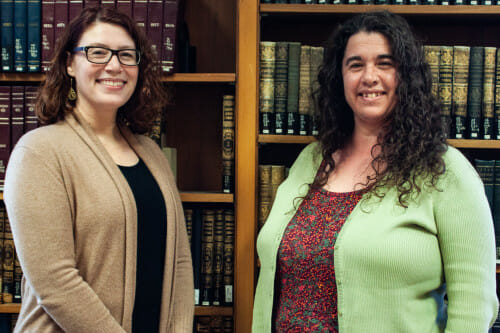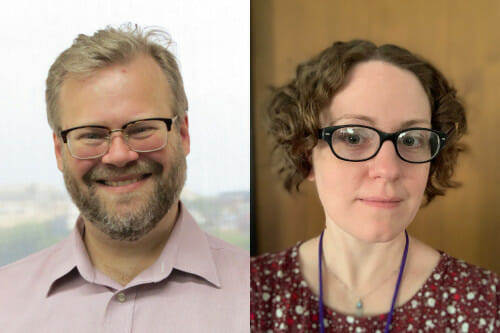Behind-the-Scenes Badgers: Answering ‘Ask a Librarian’ questions
Editor’s note: Behind-the-Scenes Badgers highlights UW employees who perform interesting, essential and sometimes undercelebrated jobs on campus.

Anne Glorioso, left, and Ellen Jacks
Job: Managers and staffers from the Ask a Librarian chat service
(Questions answered by Ian Benton, Raina Bloom, Anne Glorioso and Ellen Jacks, who coordinate the service.)
- How would you describe your job and the role it plays on campus?
We are a team of 38 library workers – librarians, library staff, and a small number of mentored graduate student employees – who respond to questions via chat. For everyone who participates in providing this service, chat is only part of our job. This means that we bring an enormous variety of subject expertise and library experience to bear on answering questions. We support researchers and information seekers in every department, unit, and area of interest on campus. We also answer questions from anyone who contacts us from anywhere on Earth who wants assistance (it’s the Wisconsin Idea, after all!).

Ian Benton, left, and Raina Bloom
- Who benefits from your work, and how do they express their gratitude?
Anyone who contacts us benefits from our work. Sometimes they benefit by finding information they need, or getting help with a technical problem. Sometimes they learn a new process. Most often, it’s a combination of these things. Our colleagues in the libraries also benefit, as we often have the pleasure of putting people who contact us via chat in touch with subject matter experts elsewhere in the libraries. We also benefit because we learn about people’s experiences of libraries through their questions. Working with people as they ask questions makes us better library workers and improves our services, tools, and collections. Our patrons thank us often and we appreciate it!
- What are the biggest misconceptions people have about librarians or libraries? Or what is a library myth you’d like to debunk?
People have a lot of misconceptions about librarians or libraries, but if we had to pick one that comes up a lot, it’s that people think that library workers spend all of our time taking care of books in quiet rooms. Print collections and study spaces are important to us, but they’re important because they exist to support people with information needs. All of our collections, print and digital, and all of our spaces, physical and online, are tools that we use in the service of our true top priority, our patrons. Everything we do in libraries is about using our expertise in information seeking to help people, first and foremost.
- What’s the most unusual “Ask a Librarian” inquiry you’ve received, and how did you answer?
One of our core values as library workers is patron privacy, so we can’t answer this question directly. We can say what makes this job fun and leads to unusual moments isn’t necessarily the individual questions, but the combination of questions we receive in a shift. In a single shift, we can find ourselves helping an undergraduate researcher working on their first big assignment, a middle schooler in Tennessee who stumbled across our service while working on their history project, someone contacting us from elsewhere in Wisconsin with a question about genealogy, a faculty member with questions about course materials, and a researcher in another country who came across something related to their home in our collections. It’s a lot of fun!
- In this day and age, information is available widely on the Internet, but still, many turn to “Ask a Librarian” – what do you provide that Google doesn’t?
Comparing a library worker to Google is like comparing a carpenter to a hammer or a doctor to a stethoscope. Google (or any search engine or database) is a tool, and we are the experts in using these tools. Information available on the commercial web is a tiny, hard-to-navigate fraction of human knowledge designed to profit off of the illusion of an easy answer to any question, not to actually help people with questions.
Library workers have extensive experience, training, and education in sitting with people and their information needs and working together to find the best possible, most contextually appropriate answers. Sometimes that means we turn to a commercial search engine like Google. More often, though, it means that we’re drawing on the massive resources of the UW–Madison Libraries, which has one of the largest collections in the United States.
- After a long day of hunting up information for “Ask a Librarian”, what do you do to relax? (Answers from the four managers of our Ask a Librarian services).
Ian Benton – I’m a life-long tabletop gamer who is happily bringing his kiddo into the hobby. I also spend lots of time in the kitchen, cranking out tasty food for the people I care about.
Raina Bloom – I’m a voracious reader, listener, and watcher. I like to bake, parent, ride my bike, and spend time online, being fannish.
Anne Glorioso – Hikes, foods, books, family/friends, and watching wrestling
Ellen Jacks – I like to utilize my superpower of turning yarn into things (stabbing things with pointed sticks!), read some fiction every day, and try to binge watch non-children’s shows.
If you just want to raise the visibility of the important contributions you and your colleagues make to the university, contact us at mjklein3@wisc.edu.




